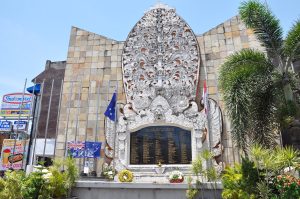On Friday, two Malaysian nationals held at Guantanamo Bay Detention Camp since 2006 were sentenced on charges of murder, conspiracy, accessory after the fact, intentionally causing serious bodily injury, and destruction of property, for their roles in the deadly bombing in Kuta in Bali, Indonesia on October 12, 2002, which killed 202 people including seven U.S. nationals.
The sentences handed down to Mohammed Farik bin Amin and Mohammed Nazir bin Lep by the military court, known as the “war court” at Guantanamo Bay, which included a panel of five jury members selected from across the U.S. military, were for 23 years for each man – without any reductions for time already served.
But that was not the full story.
Immediately after the sentencing, the judge in the case read a plea deal for the two men, which had been first drafted under the Trump administration and then adjusted over the summer. The plea deal, which trumped the judge and jury sentences, capped the men’s sentences to a maximum of six years of detention.
This was then immediately slashed again by the judge to around five years for the men due to a series of legal technicalities including prosecutors not turning over evidence in a timely fashion.
The arrangement, referred to in the media as a “secret deal,” left the victims, families of the victims and observers stunned.
The victims and families of the victims had, after all, spent several days reading victim impact statements before the war court, in which they told of lives shattered by the Bali Bombing and of horrific injuries sustained when three bombs went off outside Paddy’s Pub, the Sari Club, and the U.S. consulate in Bali.
Why go through such a process if a deal was already in place and the 23-year sentence was ceremonial at best?
It seems insensitive and insulting of the war court to insist on such a show trial, but there is also a wider question of the entire premise of the case to begin with.
Farik and Nazir were arrested in 2003 in Thailand along with Indonesian national Encep Nurjaman, alias Hambali, who is widely considered to be the mastermind of the deadly Bali Bombing (although he has yet to be brought to trial to prove this).
Shortly after they were arrested, all three men were taken to CIA black sites or clandestine prisons run by the U.S. administration where they were tortured in order to extract confessions, according to a 2014 U.S. Senate Committee Report known colloquially as the “Torture Report.”
In court last week, Nazir showed artwork that he had drawn, depicting some of the torture, including being spread-eagled on a tarpaulin while water was poured over his nose and mouth in a crude form of waterboarding.
In 2006, all three men were moved to Guantanamo Bay Detention Camp, which once housed 780 men of which only 30 remain, and were held without trial for the next 17 years. Of the 780 men once held at the shadowy prison in Cuba, only 11 have ever been charged with a crime.
Much has been made about Farik and Nazir’s roles in the Bali Bombing.
At trial, both men claimed that they had no prior knowledge of the attack, and that they had only been involved after it had happened, helping to hide some of the perpetrators and moving around funds to be used for other attacks.
According to those actually involved in the Bali Bombing, this appears to be true.
The bomb plot was allegedly masterminded by senior members of Jemaah Islamiyah, a hardline Islamist group in Indonesia, including Imam Samudra, Amrozi and Alii Ghufron alias Mukhlas. All three men were executed for their role in the bombing in 2008, while a fourth man, Ali Imron was handed a life sentence after he apologised to the court and expressed remorse for his actions.
Imron is currently incarcerated in Jakarta, having served 21 years in prison, and is now seeking a presidential pardon.
In addition to Imron, three other men are also serving life sentences for their roles in the bombing, and three others thought to be involved were shot dead in police raids. Others, such as self-confessed bomb maker Umar Patek, were handed fixed terms and are either still in prison or have been released.
As such, it seems as if Nazir and Farik’s roles in the actual bombing were minimal, if not completely non-existent, although they pleaded guilty to murder and will now always be known as “convicted Bali Bombers.”
This sounds damning but, according to the American Bar Association, some 98 percent of criminal cases in federal courts in the United States end with a plea bargain rather than a trial, making it difficult to assess whether Farik and Nazir were actually guilty of the crimes they pleaded to—or if they just did what they needed to do in order to escape the famously draconian conditions of Guantanamo Bay.
With such a murky background to the case, which has long been tainted with allegations of torture, illegal incarceration without the right to trial, and a question mark around whether the accused were involved in anything to do with the Bali Bombing, their trial at Guantanamo Bay and double sentencing rings hollow.
Certainly, anyone involved in terrorist activities should be brought to account for their crimes—but it is a weak form of justice to paint two men as mass murderers based on scant evidence, and then sentence them to five-year terms.
Perhaps the biggest takeaway from the trial is how Guantanamo Bay’s War Court continues to play by its own rules, regardless of the rights of those incarcerated in the detention camp and any thought for the victims and families of terrorism.

































